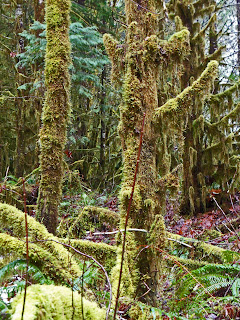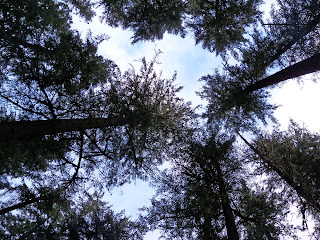where trees grow old
the ones that were
and the ones that won
after the saw
and clanging mill
diamonds on her neck
help her sprout
new art
roaring surf
among giants
unnoticed
I didn’t hear
did you?
a fir has fallen
don’t tell
where loggers couldn’t reach
his bushy hair
in the Oregon woods
the humble ones
miniature forest
mortals dwell
my path a sponge
clear and soft
how dare a friend
act like that
keep flowing
a forest lurks

I didn’t count the rings on this old douglas fir, didn’t take the time. It grew fast with wide healthy rings when young. But as it aged, the rings narrowed and rot set in. I’m guessing it was born about the time of Thomas Jefferson.
I grew fast when young
slowed with age
my rings can tell
this aging body
see here when it was young
her rings are broad
her wood young
while the young stand straight
will anyone see her fall?
flesh decayed
her spirit feeds the young
having never fallen
it does not know how
climb in trees
none strange
with small trees
bonsai
sinking lower
snowy trail

I went to the boondocks today, as a logger would say, or boonies for short. A trail heads south out of Oakridge, up the steep side of Salmon Creek to a ridge leading to a panoramic lookout rock. The Larison Rock Trail climbs about the same elevation as going from Pasadena to Mt. Wilson. I call it a Ginkgo Walk because it’s the name haiku writers give to places they walk for poetic inspiration. I didn’t go for that reason, but soon found my reason changing.
 I only made it halfway to Larison Rock because the snow is much deeper up there, and trudging difficult. I saw no tracks in the snow other than mine and a few small rodents.
I only made it halfway to Larison Rock because the snow is much deeper up there, and trudging difficult. I saw no tracks in the snow other than mine and a few small rodents.  When a photograph leads an inquiring mind away from its literal content, and when such thoughts become words in the haiku form, like a hiker leaving the trailhead for Larison Rock, this is what the Japanese call haiga. Often the words are written directly on the photograph. Some of mine above are haiga and others are haiku or prose that describe the pictures. You are welcome to use any of my photos as trailheads. I would be delighted to see your haiga skipping back home along the Larison Rock Trail.
When a photograph leads an inquiring mind away from its literal content, and when such thoughts become words in the haiku form, like a hiker leaving the trailhead for Larison Rock, this is what the Japanese call haiga. Often the words are written directly on the photograph. Some of mine above are haiga and others are haiku or prose that describe the pictures. You are welcome to use any of my photos as trailheads. I would be delighted to see your haiga skipping back home along the Larison Rock Trail. 





























beautiful ginkgo walk, I will try to take it with you
ReplyDeletephoto #1
fits like a glove
my new winter jacket
is green
photo #2
ReplyDelete(I love how you see the diamond necklace! My first reaction was a little less elegant.)
this spring
I hope to sprout
a green thumb
Sharon,
ReplyDeleteI love this posting, the pictures are beautiful and the haiku as well... I know how much you love haiku, and I think you are now back home in Haiku land. It is great to see you blossom into the woods of haiku trees and moss.
More Haiku in the woods with you !!
Love,
Michael
photo #3 (So good to hear Michaels voice echoing in your blog space, and he knows so well your love for haiku!)
ReplyDeleteour skype call
new snow on the mountains
your loud free voice
Sharon, I also love your green bathing suit vision, and this photo!!
ReplyDeleteHmmm, I see three little haiga tripping down the Larison Rock Trail. Cute and unusual they are, yet linked along paths from common ground. Will there be more, and how will you attach them to a particular photo? I wait to see.
ReplyDeletelong dead
ReplyDeletebut having never fallen
it does not know how
This is phenomenal! I love all the pics and poems--really beautiful. Though this poem really hit me deeply. I might even take out the "but".
Long dead
having never fallen
it does not know how
My mind races to ruminate...a person who has never fallen...never fallen in love, long dead without the experience of love. Or perhaps having never failed one cannot know the experience of living. Or...looking at the tree standing straight and without life, it's like a ghost existence. Thinking it is alive but it is not, the way some people exist. Profound!
Lois! I had this poem waiting, thinking about it, in response to #4 and $5 the trees and then the tree tops,,,(love those giants, Sharon)
ReplyDeleteI fall in love
with winter
my changed perspective
Wet tree shivers above
ReplyDeleteIts chilly head becomes you.
Lois, I agree the “but” is not important. What’s important is your multiple meanings, where a tree, it seems, knows how to grow and resist wind and snow, and how to make babies, but not how to fall. So many ideas spring from that.
ReplyDeleteKathabela, the tall trees look down where mortals dwell, their heads so far above, they are free from shadows and piled up snow, drinking the life-giving sun while lower chlorophyll beings struggle for food. It’s a changed perspective when you move up, become tall. It’s enough to make one love the winters that once oppressed.
Steven, while that is one way of looking at it, on the other hand, my chilly head, wet from snow the wind blew from trees, did not feel becoming until you said it. I love the ways your words spin me through different moods. It’s only two lines, but to me it is good haiku, and set to the pictures of tall trees, is good haiga.
#6 is the fallen tree (unheard)
ReplyDeletejet trail
so white so sure
I watch it disappear
deep cobalt blue
ReplyDeletein the firs, snow
branches reach skyward
Several of you have written haiga or other poetic forms based on these photos. You have posted them here or sent them by email. I would like to post all of them and any more you write, setting each with the photo it springs from, in haiga tradition. Sometimes I don’t know which photo you used; maybe you will tell me. I will wait a few days before doing this, so keep them coming. Thanks for all you have sent so far.
ReplyDeleteI am writing on them in order, walking through at my own pace, as I am inspired, I think you know from my sequence and descriptions, which is for which...the next one is always in my mind...
ReplyDeletesharon, are the photos numbered for the haiku?
ReplyDeleteI don't see any numbers. My haiku was for the blue sky and branches photo.
all the photos are breathtaking...
susan